NYFF VIDEO: BAUMBACH & PALTROW ON 'DE PALMA'
AND OTHER LINKS SURROUNDING THE P&I SCREENING FROM LAST WEEKThe video above comes from last week's press and industry screening of
De Palma at the New York Film Festival.
Amy Taubin was on hand to discuss the film on stage following the screening, telling the two filmmakers at the end that after watching their film, everyone on the NYFF selection committee would say that they wanted to go back and look at all of
Brian De Palma's films now.
The second-to-last question from the audience is from a woman who worked on
Carlito's Way. Here is the Q&A transcript from that exchange:
Publicist: Could you talk a little bit about Mr. De Palma as a teacher? I’d describe him as one of the most generous directors I’ve ever had the pleasure of working with. I was a unit publicist for Carlito’s Way, and he didn’t say a word to me. But I never got kicked out of video village, anything I wanted to see I got to see, and it was the most amazing experience. I didn’t realize until watching this that… he’s a teacher. So could you talk a little bit about that?
Paltrow [nodding rigorously] : I really think that’s where the movie comes from. I think you sort of summed it up. That’s our experience of Brian, too, and that’s, exactly—not getting kicked out of video village… you know, virtually everybody would do that. I mean, that’s such a unique thing. And I bet you it’s not even conscious, he’s not distracted by that sort of thing. But that’s the core, I think, why we even made this in the first place.
Baumbach: Yeah, it’s interesting. I always knew about Home Movies, but in going through the timeline of his career, I guess I never quite thought, until we were doing the interviews and cutting the movie, is that he already had made Carrie and The Fury, and was now going to Sarah Lawrence and making this tiny movie with students and, you know, it’s so idiosyncratic. But as you know, Brian, as you point out, as you get to know him, it doesn’t actually seem out of line with the career—it actually seems very much in line with it. But it’s still… I don’t know any other filmmaker who’s done something like that.
MORE LINKS
Emily Buder, IndieWire
"'The Hollywood system destroys creativity,' Brian De Palma tells us in Noah Baumbach and Jake Paltrow's documentary. That's not the first nor the last of the impassioned statements the director makes throughout the course of the film, which feels less like a retrospective and more like a cinephile confessional. 'It's in the same spirit as having coffee with him,' said Paltrow. That is, if you take your coffee blood red...
"Studio veteran influences aside, one of the most surprising revelations of De Palma is the extent of the director's stalwart low-budget conviction. 'What's the point of film school if kids don't learn how to create low-budget movies?' De Palma asks in the film. Clashes with studios, such as Columbia and Paramount, further highlight his commitment to his vision. But what stands out most is one of the most original films any low-budget guru has ever attempted... [In that last sentence, Buder is referring to Home Movies, as she then segues into the quotes from Baumbach talking about that film.]
"Throughout the film, De Palma speaks candidly of his confrontations with failure. Embedded within every film is a colony of mistakes, regrets and blunders De Palma is quick to detail. 'Your films are like a public record of things you didn't finish,' he says."
Jason Bailey, Flavorwire
"In De Palma, the filmmaker makes no attempt to hide Hitchcock’s influence — in fact, it opens with him describing the formative experience of seeing Vertigo at Radio City Music Hall, something he says he 'will never forget.' If anything, De Palma seems confused that more of his contemporaries weren’t influenced in the same way, situating themselves similarly as 'practitioners' of the vocabulary Hitch perfected.
"The two filmmakers now also share the experience of walking through their careers with younger directors who idolize them, and De Palma has both the scope and specificity of the essential text Hitchcock/Truffaut, covering the entire career (even the movies we don’t really talk about) while pausing for in-depth explanations of the reasoning behind certain iconic shots, or the aesthetics of trademark techniques."
Anne-Katrin Titze, Eye For Film
"On the way out of the theatre, I told both of them that I was not the greatest De Palma fan, that I actually despised Passion, and that their documentary made me reconsider and curious to go back and re-watch a number of his films (not Passion, though). 'That's a good reaction to have,' Baumbach responded. Paltrow, when I brought up the great sense of completion due to the fact that they discuss all of his movies, confirmed that for them that was also a very important factor."
Nick Newman, The Film Stage
"Being a great admirer of Brian De Palma, I found that no film from 2015 was as purely pleasurable as Noah Baumbach and Jake Paltrow‘s De Palma, a blow-by-blow examination of the director’s massive oeuvre. Its structure is simple — De Palma speaks candidly about his upbringing, early efforts, and subsequent successes (as well as failures); many clips and archival materials are interspersed — but the effect to which their resources are wrung evinces a great deal of attention and care. In Baumbach’s own words, 'This is the only movie, probably, I can safely say, that I’ll be involved with that I can just keep watching over and over again. I find it so interesting.'
"After screening their work for press and industry members at this year’s New York Film Festival, the pair engaged in an Amy Taubin-led Q & A featuring audience questions. It’s hit-and-miss, as these things tend to be — I’ll pat myself on the back a little too strongly by noting that my own question, the very last, is the only one that seems to impress and stump both of these De Palma experts — but good insights are gathered throughout. My favorite part? When Baumbach explains the unexpected influence by saying, 'In a way, Brian, for me, sort of existed as what movies were awaiting me as a I got older. And then, once you start seeing them, they kind of go into your head and they don’t come out. I carry so many of those images over. The way I remember them, when I revisit them, I’m always surprised at how different they might be than the way I remembered them.'”
 The Hollywood Reporter's Gregg Kilday writes, "Brian De Palma is having a moment." Anticipating the upcoming screening of De Palma at the New York Film Festival, Kilday talked to NYFF director Kent Jones. "I remember the excitement I felt when I saw Dressed to Kill and Blow Out for the first time," Jones tells Kilday. "I went back to see both of them again a day later. During that time, there was a great debate about De Palma — he was hopelessly derivative of Hitchcock, he was a misogynist, he did sequences but not films, his stories didn't come together and so on. I fell into some of that punitive stuff myself."
The Hollywood Reporter's Gregg Kilday writes, "Brian De Palma is having a moment." Anticipating the upcoming screening of De Palma at the New York Film Festival, Kilday talked to NYFF director Kent Jones. "I remember the excitement I felt when I saw Dressed to Kill and Blow Out for the first time," Jones tells Kilday. "I went back to see both of them again a day later. During that time, there was a great debate about De Palma — he was hopelessly derivative of Hitchcock, he was a misogynist, he did sequences but not films, his stories didn't come together and so on. I fell into some of that punitive stuff myself."



 Ryan Murphy directed the first hour of tonight's two-hour Scream Queens premiere on FOX. The premiere opens with a scene set in 1995, at a sorority house party. The first shot is a close-up on a girl's blood-soaked hands, the right one quivering. She holds them palms-up as she walks through a party crowd to her sorority sisters. When the head sister sees her, she says, "Did you just get your period all over yourself?" [Small SPOILER ALERT]..... It turns out that the blood belongs to a pledge who has just given birth in a bathtub upstairs. The kicker (and this is so very 1995) is that the girl didn't have any idea she had even been pregnant.
Ryan Murphy directed the first hour of tonight's two-hour Scream Queens premiere on FOX. The premiere opens with a scene set in 1995, at a sorority house party. The first shot is a close-up on a girl's blood-soaked hands, the right one quivering. She holds them palms-up as she walks through a party crowd to her sorority sisters. When the head sister sees her, she says, "Did you just get your period all over yourself?" [Small SPOILER ALERT]..... It turns out that the blood belongs to a pledge who has just given birth in a bathtub upstairs. The kicker (and this is so very 1995) is that the girl didn't have any idea she had even been pregnant.
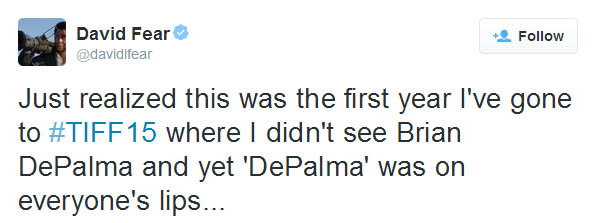
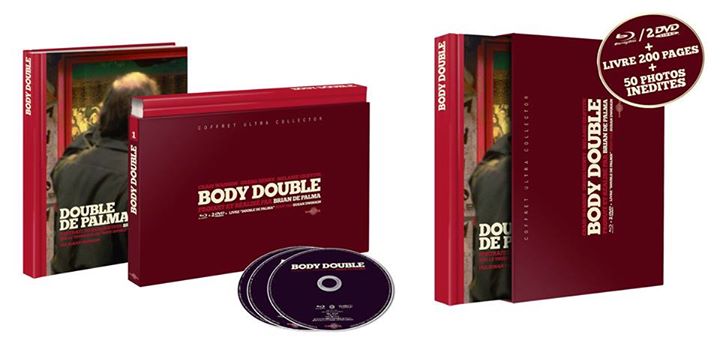
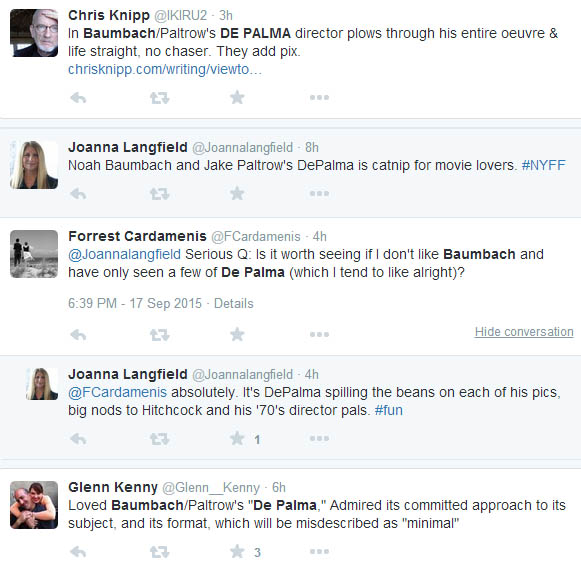
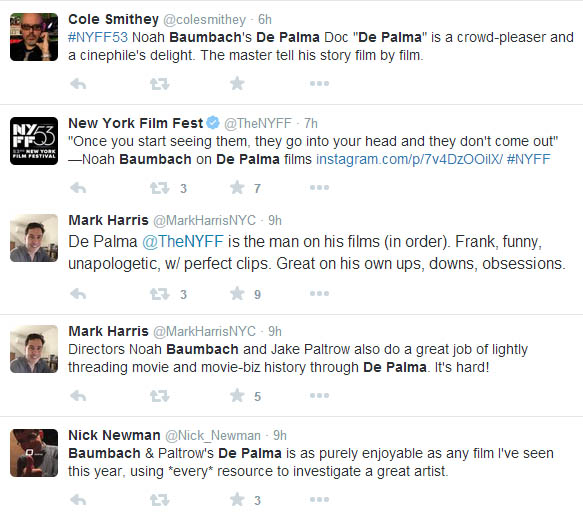
 Thanks to Hugh for letting us know that Tom Wolfe will speak following a screening of The Bonfire Of The Vanities, Brian De Palma's film adaptation of Wolfe's most famous novel. The event will take place at 7pm October 27th, at
Thanks to Hugh for letting us know that Tom Wolfe will speak following a screening of The Bonfire Of The Vanities, Brian De Palma's film adaptation of Wolfe's most famous novel. The event will take place at 7pm October 27th, at 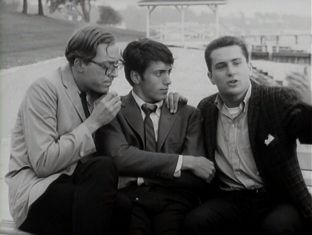 Robert De Niro has been out promoting his new film, a Nancy Meyers comedy called The Intern.
Robert De Niro has been out promoting his new film, a Nancy Meyers comedy called The Intern.